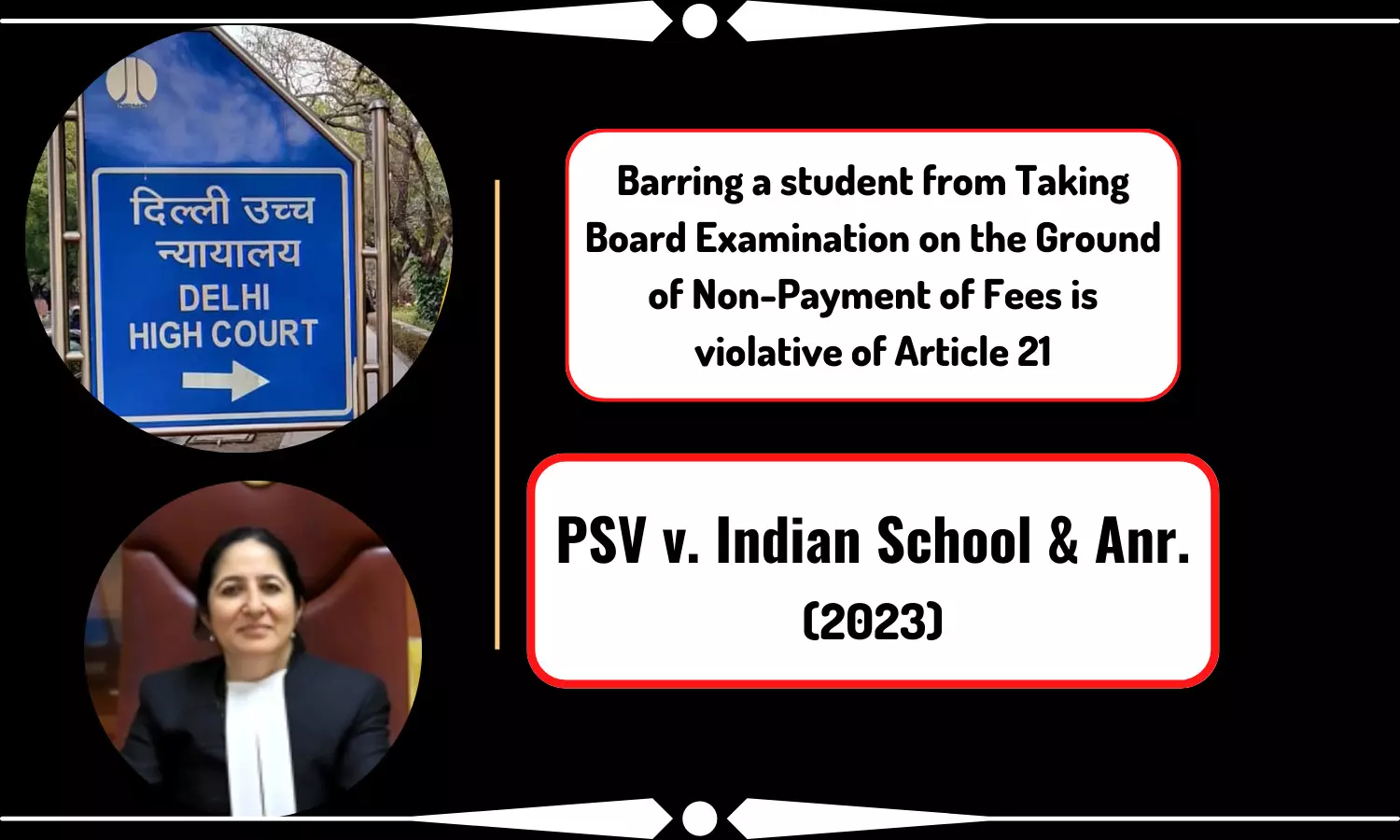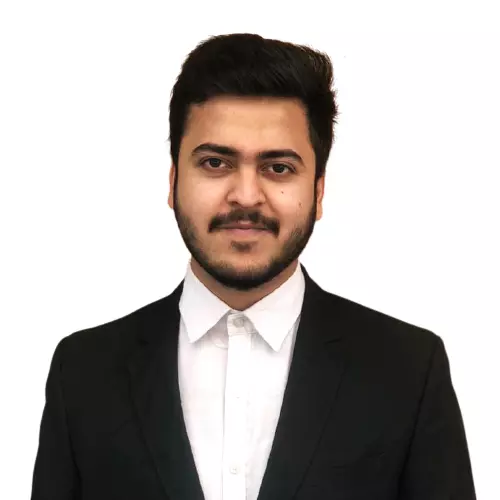Case Analysis: PSV v. Indian School & Anr., (2023) | Barring a student from Taking Board Examination on the Ground of Non-Payment of Fees is violative of Article 21
This case analysis, 'PSV v. Indian School & Anr.' elaborates upon how the rights of a child as guaranteed under Article 21 are explained to be non-negotiable while also balancing the rights and authorities of the private schools to collect fees.

The case analysis 'PSV v. Indian School & Anr.,(2023)' elaborates upon how the rights of a child as guaranteed under Article 21 are explained to be non-negotiable, while also balancing the rights and authorities of the private schools to collect fees. This case is an important judgement with regard to the autonomy enjoyed by the private unaided schools as it defines the limit and scope of the same. The judgment of the said case elaborates and reinstates the importance of...
The case analysis 'PSV v. Indian School & Anr.,(2023)' elaborates upon how the rights of a child as guaranteed under Article 21 are explained to be non-negotiable, while also balancing the rights and authorities of the private schools to collect fees. This case is an important judgement with regard to the autonomy enjoyed by the private unaided schools as it defines the limit and scope of the same. The judgment of the said case elaborates and reinstates the importance of the right to education along with the right to life and dignity.
Court: High Court of Delhi
Citation: W.P.(C) 584/2023
Date of Judgement: 17th January, 2023
Bench: Justice Mini Pushkarna
Facts of the Case
Due to non-payment of school fees, the name of the petitioner, who is a class 10th student, was struck off from the school records. In furtherance, because of this, he wasn’t being permitted to appear for the Board Exams, which were to commence on 18 January 2023. The petition was listed for urgent hearing due to the date of the exams being immediate. The student (petitioner’s father) informed that he had been paying the school fees regularly since 2011 when the student got enrolled in the school and that it was only after the pandemic and in the year 2021 that the fee payment became irregular. The father wanted to persuade the school authorities attempting to explain how due to losses faced by him he was unable to pay the fees but the school refused to entertain any of his pleas.
After receiving the mail from the school, which indicated that his son’s name has been struck off from the school records, the father of the petitioner approached the Directorate of Education (DOE), asking him to stop the school from striking off his son’s name from the school roll. The DOE did write a letter to the school requesting them to not strike off the names of students who had not paid fees and to allow them to appear for the examinations. Meanwhile, the father of the petitioner had also approached DCPR (Delhi Commission for Protection of Child) requesting their cognizance of the matter. The DCPR also, via its order dated 13.09.2022 directed the school authorities to not bar any of the students who had not paid the school fees from appearing for the half-yearly exams until the inquiry by the commission was pending in the said matter.
As a result, the school did permit the student (petitioner) to appear for the half-yearly exams that were ongoing at that time. However, on 19.11.2022 the school once again sent a mail to the petitioner’s father informing him that his son’s name had once again been struck off from the school roll due to non-payment of fees. Even after trying to make numerous attempts, the petitioner’s father was not being able to convince the school to grant him permission to appear for the Class 10th Practical Board Examination and attend the school.
Issues Involved
The main issue involved in this case which had to be adjudicated upon by the Delhi High Court, was:
- Whether a student could be barred from taking examinations upon non-payment of fees, and would the same be an infringement of the rights of a child as guaranteed by Article 21 of the Constitution of India?
Laws Applied
In order to adjudicate the said case, the Delhi High Court referred to the rights guaranteed to a child under Article 21 of the Constitution of India. It is important to note that along with that, every child also has a right to education, right to life and liberty, which form the fundamental rights that every person has by the very virtue of being an Indian citizen. Thereby, it became important to evaluate whether the school, which also has a right to collect fees and thereby take actions for non-payment, could be granted this much power so as to bar a student from appearing in the class 10th board examinations. The court also made reference to the DSER, 1973 (The Delhi School Education Rules, 1973) in order to decipher the correct stance that addressed whether the child’s rights were being infringed by this act of the school or not.
Judgment/ Decision
While giving its judgement in the said case, the Delhi High Court referred to a number of cases to stipulate how the rights of a child must be guaranteed. At the same time, there must also be at least some onus on the petitioner’s father in lieu of the unpaid fees of the school. The Delhi High Court first referred to T.M.A. Pai Foundation v. State of Karnataka, 2002 SCC OnLine SC 1036 wherein the Supreme Court had stated education to be an ‘essentially charitable object’ while making reference to Article 19 (1)(g) and implying that education did not fall under any of the categories of profession, occupation, trade or business.
The Delhi High Court reinforced the fact that “a child cannot be made to suffer and not be allowed to attend classes or barred from taking examinations in the middle of an academic session on the ground of non-payment of fees.” The court regarded the act of school as infringing the rights of the child, in the scenarios wherein he was not permitted to sit for the Board Examination. The infringement of Article 21, which guarantees the Right to Life can be implied from such a bar being put on the petitioner. The judgement in the said case also emphasized how Article 21 A which talks about the Right to Education explains the intent of the legislation to prioritize education for children.
In Bandhua Mukti Morcha v. Union of India and Ors., (1984) 3 SCC 161, the Supreme Court had elaborated upon the understanding of Article 21 to mean and include all such situations, circumstances and opportunities that imply human dignity, free from exploitation. Thus while referring to this case; the Delhi High Court emphasized the necessity to adhere to the essence of Article 21.
The court gave sufficient importance to the education and examination of Class 10th and 12th as they are crucial in deciding a student’s future prospects. The court, therefore, tried to elaborate on how it would be unjustifiable to make the petitioner suffer for the said delay or non-payment of fees.
However, in order to create a balance and also put forth the viable and legitimate plea of the private schools as set up in Delhi, the court referred to Master Divyam Bhateja through father Mr Vinod Bhateja v. Bhai Parmanand Vidya Mandir and Ors., W.P. (C) 8466/2022, wherein it was stated that while it is true that the Right to Education Act guarantees education to all children, however, the same cannot be ‘unconditionally enforced’ against a ‘private unaided school’. In the referred case, the Delhi School Education Rules were also brought into the picture so as a postulate that the petitioner has the choice to opt for government schools if the private school’s fees are unaffordable.
By referring to the above case, the Delhi High Court stipulated the balance between the rights of the petitioner and the rules and regulations under DSER, 1973. While applying the same principle as per the best-suited alternative, the court stated that while it is true that the student (petitioner) cannot be permitted to continue studying at the school with non-payment of fees from his end, barring him from appearing for Class 10th Board Examinations is not the most prudent way to deal with the situation either. This would only torment the petitioner and further cause infringement of his rights. Moreover, the student (petitioner) has already been registered with the CBSE for the said class 10th Board Examinations, and so at that juncture, refusing him to sit for exams would not be viable.
The Delhi High Court finally adjudicated and gave its final judgement whereby it directed the school to lift the ban imposed on the petitioner for sitting for the exams; moreover, it ordered the school to issue the petitioner the roll number for CBSE Class 10th Board Examinations. But to balance the equity, the petitioner’s father was directed to pay a total sum of Rs. 30,000 within four weeks of the judgement, to the school, in lieu of the pending payment. The petitioner’s father was thus relieved from paying the entire amount of the pending dues and was thus ordered to pay a p
Important Links
Law Library: Notes and Study Material for LLB, LLM, Judiciary, and Entrance Exams

Snehil Sharma
Snehil Sharma is an advocate with an LL.M specializing in Business Law. He is a legal research aficionado and is actively indulged in legal content creation. His forte is researching on contemporary legal issues.
